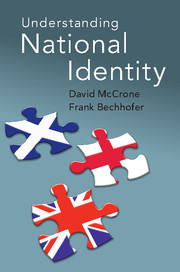Book contents
- Frontmatter
- Contents
- List of tables
- Preface
- Introduction
- 1 Thinking about national identity
- 2 Accessing national identity
- 3 National identity: do people care about it?
- 4 Debatable lands: national identities on the border
- 5 Claiming national identity
- 6 The politics of national identity
- 7 The notional other: ethnicity and national identity
- 8 A manner of speaking: the end of being British?
- 9 Whither national identity?
- Appendix National identity publications
- Bibliography
- Index
5 - Claiming national identity
Published online by Cambridge University Press: 05 April 2015
- Frontmatter
- Contents
- List of tables
- Preface
- Introduction
- 1 Thinking about national identity
- 2 Accessing national identity
- 3 National identity: do people care about it?
- 4 Debatable lands: national identities on the border
- 5 Claiming national identity
- 6 The politics of national identity
- 7 The notional other: ethnicity and national identity
- 8 A manner of speaking: the end of being British?
- 9 Whither national identity?
- Appendix National identity publications
- Bibliography
- Index
Summary
We have seen in previous chapters that national identity matters to people in England as well as Scotland. It is an important part of the way people in both societies describe themselves, although it operates somewhat differently north and south of the border. As we showed in Chapter 2, Scots, whether they live in England or Scotland, are well able to ‘talk the talk’, whereas, as Susan Condor and her colleagues show, identity talk in England is more muted (Condor, 2006).
Being able to show, however, that national identity matters to people in both countries is only a first step. In Chapter 2 we introduced the idea of identity markers and identity rules, that is, the characteristics which people use in claiming national identity or attributing it to others, and the rules or procedures they employ in the process. We regard these markers and rules as the conventions by which people develop and maintain a sense of their own and others' national identity. Such markers and rules are usually implicit and unproblematic, which is why we sought out contexts where national identities were problematic or ambiguous. Of course these are not ‘typical’, but they have heuristic value in terms of research design as they make more apparent what is normally taken for granted.
In this chapter, we will explore how people deal with claims to national identity; how they present their own claims; how they attribute national identity to others; and how they themselves receive the claims of others, or react to attributed claims by a third party. Studying these processes enables us to address a key question of societal structure: who is ‘one of us’ who do we include as ‘people like us’, and who do we choose to exclude. Most of the time this matters little, but it can become a live political issue.
- Type
- Chapter
- Information
- Understanding National Identity , pp. 97 - 119Publisher: Cambridge University PressPrint publication year: 2015

